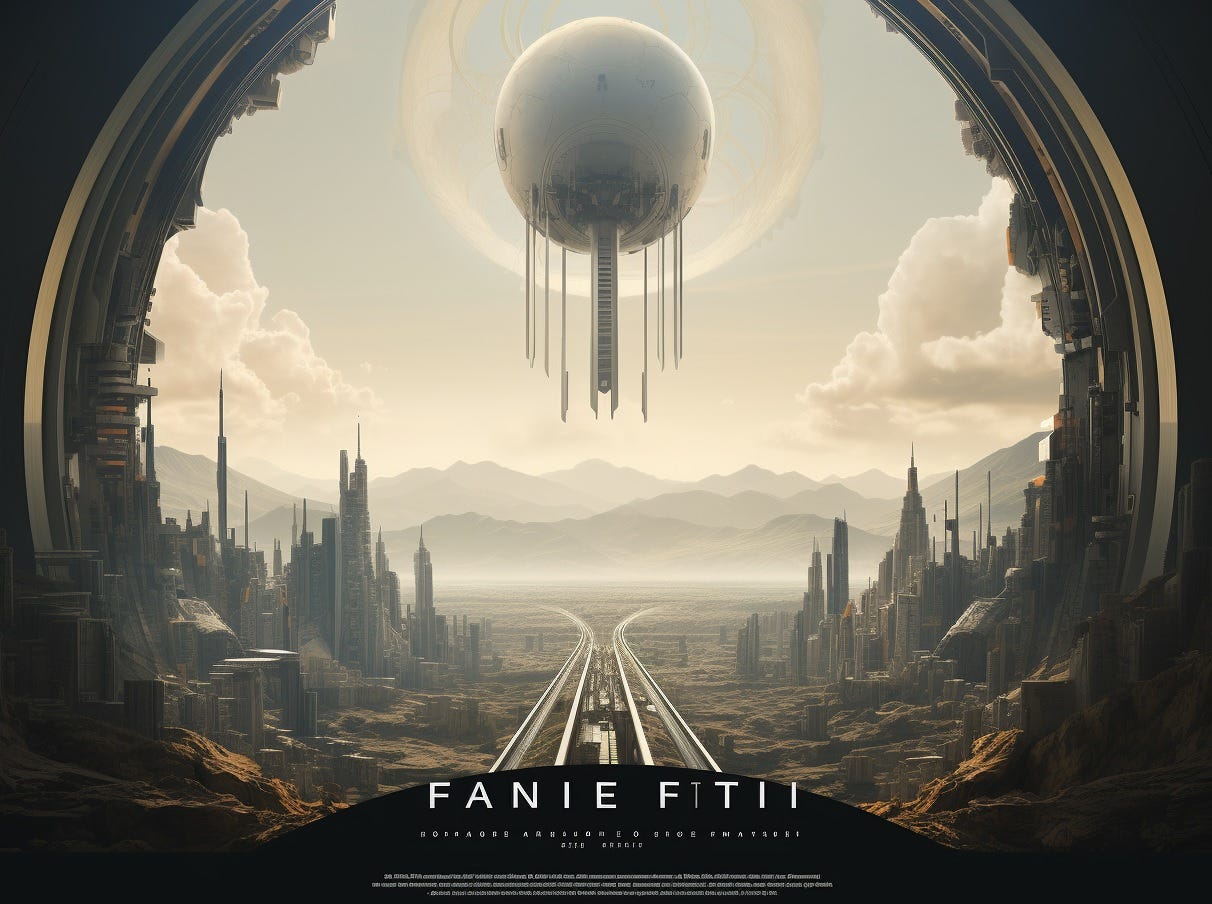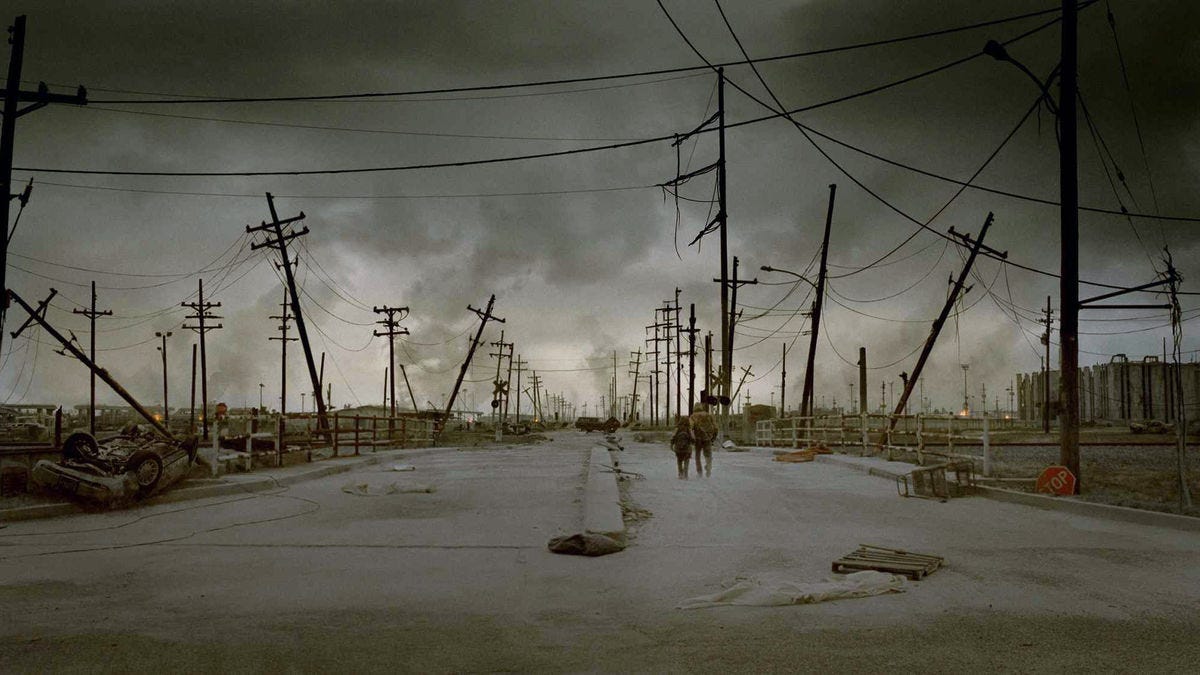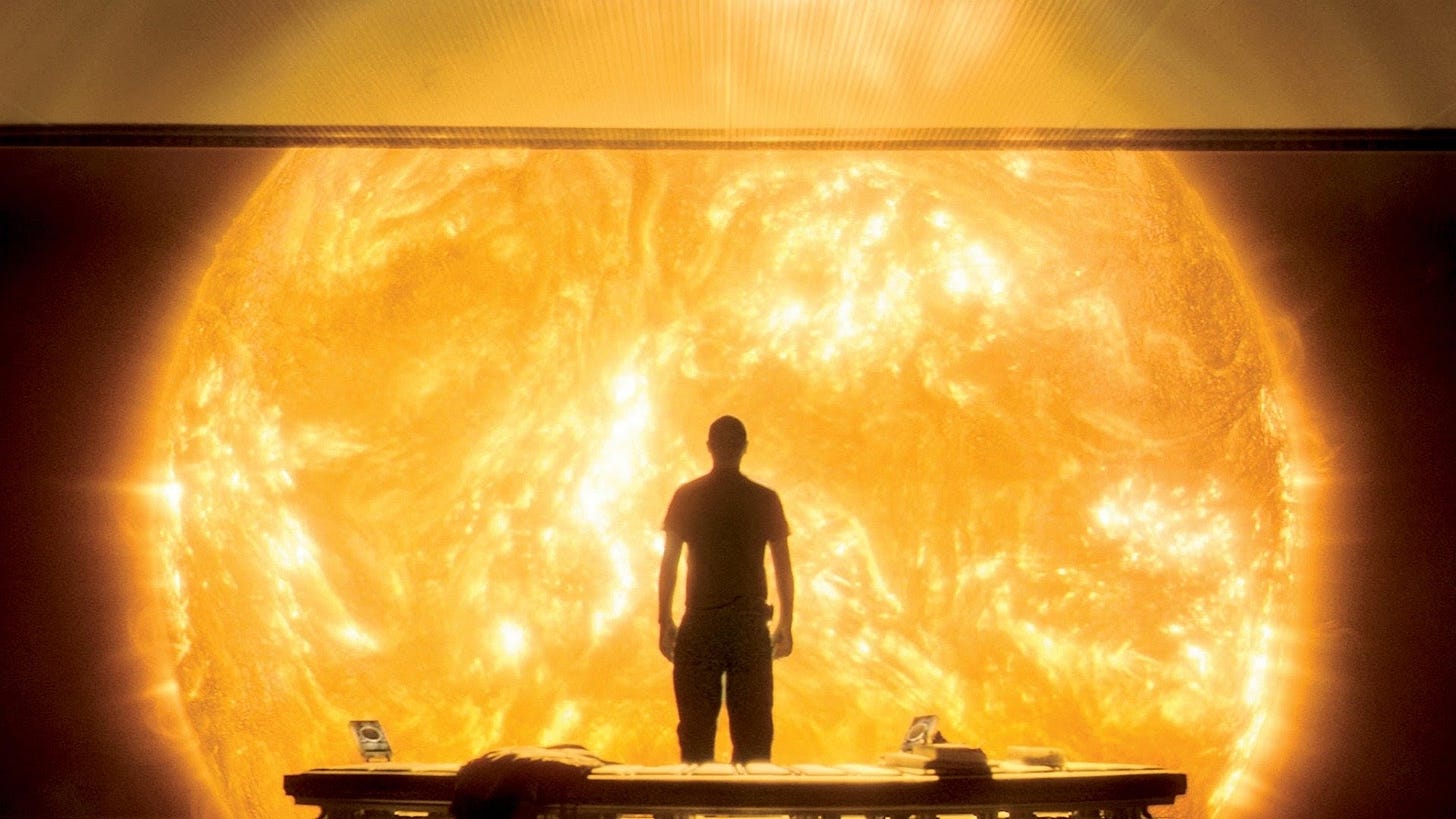⤴⏩ Some surprising Up Wing and e/acc films
'Jurassic Park' and 'The Road' are some of the movies that are more pro-progress than you might think
Quote of the Issue
“The single most important thing that could be done would be to substitute reasonably accurate positive images of the future for the depressing images that now prevail, especially in the Advanced Capitalist nations.” - Herman Kahn, as quoted in The Conservative Futurist: How to Create the Sci-Fi World We Were Promised.
Now on sale everywhere:
My new book The Conservative Futurist: How To Create the Sci-Fi World We Were Promised
The Essay
⤴⏩ Some surprising Up Wing and e/acc films
Super-short Summary: Author Michael Crichton said stories require tension, not utopia. But techno-optimistic fiction with problems can still convey an Up Wing message. 1960s sci-fi was overshadowed by dystopian visions, and today's dark view of technology echoes 1970s assumptions. To balance AI coverage, reporters could reference films where technology helps humanity, but few exist. Let’s imagine an optimistic sci-fi festival: The Martian — innovation rescues a stranded astronaut; Interstellar — humanity returns to the stars; 2001: A Space Odyssey — space-faring humanity has only begun. Even bleak The Road shows disaster from an asteroid, arguing for more tech progress. Koyaanisqatsi inadvertently shows humanity's engineering marvels. Sunshine and Jurassic Park interlace caution with techno-optimism. We need more inspiring sci-fi, but new AI tools let anyone create positive visions.
Author Michael Crichton, whose many books often showed the scary potential of emerging technologies, once said, “If you imagine a future that’s wonderful, you don’t have a story.”
I mean, sure, to a point. A compelling story needs tension, risk, stakes, and conflict. Utopia might make for an interesting vignette or short film, but that’s about it.
A piece of pro-progress, future-optimistic fiction can, however, be full of problems — or even set in an all-out dystopian setting — and still have a deep techno-solutionist and Up Wing message. What’s more, it’s important that such stories get made and widely disseminated. Techno-optimistic 1960s science fiction was overshadowed by bleak, dystopian visions of climate disaster, atomic war, overpopulation, and plague. Today's predominant dark view of the future in books, films, and TV still echoes 1970s assumptions about technology and economic growth as existentially dangerous. It’s no surprise to me, for instance, that The Terminator has been frequently employed in news stories about generative AI.
Yet if reporters wanted to balance their pieces with references to popular films where AI is shown as a valuable tool for humanity or even the hero of the piece, the possibilities are far less obvious. Which says something about our society — and not something encouraging. As the 19th-century English art critic John Ruskin put it, “Great nations write their autobiographies in three manuscripts, the book of their deeds, the book of their words, and the book of their art. Not one of these books can be understood unless we read the two others, but of the three the only trustworthy one is the last.”
So let’s say you wanted to put on an Up Wing, Effective Accelerationist film festival that wasn’t just Star Trek movies. What might you show? I think some obvious picks would be The Martian (stranded astronaut on the Red Planet innovates his way to rescue), Interstellar (humanity returns to the stars to escape a dying Earth), and 2001: A Space Odyssey (a space-faring humanity finds out they’ve only just begun). And I thoroughly dig into all three films in The Conservative Futurist.
But I might round out such a film festival with a group of films that don’t seem obviously Up Wing or “e/acc” in their themes:
➡ The Road. The 2009 film (based on the 2006 novel of the same name by Cormac McCarthy) — a post-apocalyptic drama that follows a father and son traversing a charred landscape, struggling against starvation, cannibalistic survivors, and their own despair — is one of the most depressing films I’ve ever watched. But it’s the reason I’m writing this essay. I recently rewatched The Road for the first time since writing my book. Perhaps that’s why I really focused on the murky origin of this desolate world. Although the cause of the devastation is never specified, I think the internet consensus is that there was a massive comet or meteor strike. In other words, global disaster wasn’t caused by consumerist economic growth or technology — as could be argued if the problem was climate change or nuclear war — but by a lack of tech progress, namely planetary defense. The film serves as a powerful message in favor of acceleration.
As I write in The Conservative Futurist about planetary defense:
We may be in greater danger than we’ve previously assumed because Earth’s large impact craters are bigger than previously thought, according to a recent NASA analysis. The larger size suggests the impacts were far more violent events than scientists had calculated. Given that reality, how sophisticated are our current asteroid deflection capabilities? In September 2022, NASA crashed a 1,300-pound probe into Dimorphos, a space rock just five hundred feet wide, that was orbiting a larger asteroid called Didymos, altering the small rock’s orbit. “This mission shows that NASA is trying to be ready for whatever the universe throws at us,” said NASA administrator Bill Nelson at the time. “NASA has proven we are serious as a defender of the planet.18 This is a watershed moment for planetary defense and all of humanity.” The phrase “trying to be ready” is key here. Earth remains as deeply vulnerable to stray asteroids and comets as it was in 1908 [before the Tunguska comet strike in Siberia] or ever.
➡ Koyaanisqatsi: Life Out of Balance. The 1982 non-narrative “tone poem” directed by Godfrey Reggio with music composed by Philip Glass and cinematography by Ron Fricke uses various visual techniques, such as slow and speeded-up motion to depict modern society as disrupting the natural balance of life. Yet looking closer, the beauty of human ambition shines through. The expressways, skyscrapers, and airplanes highlight engineering marvels built through cooperation and ingenuity. The Boeing 747 and Saturn V are, in their own way, as beautiful as the rock murals in Utah and the Grand Canyon. Roger Ebert rightly noted the dual perspective in his review: “What a piece of work is a man! And what expressways he builds! … Koyaanisqatsi, then, is an invitation to knee-jerk environmentalism of the most sentimental kind.”
The unspoken and unintended acknowledgment of our species’ remarkable aptitude to innovate, create, and irrepressibly surge forward, as evidenced by the technological marvels and urban expanses showcased within the film, is absolutely breathtaking So while the film invites viewers to reflect upon our environmental trajectory and ponder the Limits to Growth sustainability of modern civilization, it inadvertently becomes a powerful testament to the architectural, technological, and societal constructs of humanity. Music is great, too.
➡ Sunshine. Danny Boyle’s 2007 sci-fi thriller subtly infuses a potent pro-technology message. Set in the not-so-distant future, humanity, despite being on the brink of extinction due to the dying sun, engineers a spacecraft that is not only capable of traversing the vast expanse of space, but also carries a “stellar bomb” with the mass of Manhattan — it’s made from all of Earth’s uranium — to reinvigorate our star. We never see any panic on Earth, merely the result of humanity’s ingenuity and perseverance. The final message to his family back on Earth from astronaut Robert Capa (played by Cillian Murphy):
By the time you get this message, I'll be in the dead zone. It came a little sooner than we thought, but this means you won't be able to send a message back. So, I just wanted to let you know that I don't need the message because I know everything you wanna say. Just remember it takes eight minutes for light to travel from sun to Earth, which means you'll know we've succeeded about eight minutes after we deliver the payload. All you have to do is look out for a little extra brightness in the sky. So if you wake up one morning and it's a particularly beautiful day, you'll know we made it.
➡ Jurassic Park. Based on Crichton’s best-seller of the same name, the blockbuster film undeniably presents the book’s cautionary tale about genetic editing, underscored by Ian Malcolm’s (Jeff Goldblum) famous critique of scientific hubris, warning that the genetic tinkerers "didn’t stop to think if they should." But the 1993 Spielberg-directed film adaptation intriguingly interlaces this message with a vein of techno-optimism. The early inclusion of the cartoon Mr. DNA, an anthropomorphic, jovial DNA strand with a distinctive Texas accent, notably lightens the dense explanation of the dinosaurs' scientific resurrection. The sequence is absolutely Disney-esque and reinforces the Walt Disney parallel with John Hammond (Richard Attenborough), the park’s affable yet single-minded founder. Also this: Even with the dinosaur breakout, Jurassic Park still looks pretty dang cool, and no doubt many would want to visit a real-world version.
The concept of “de-extinction,” or reviving extinct species, has moved from science fiction to serious scientific pursuit. There are numerous projects aiming to bring back extinct animals through selective breeding of existing species to emphasize ancestral traits, cloning using preserved DNA in related species' eggs, and gene editing to introduce extinct genes into relatives' genomes. Among them: reviving wooly mammoths by editing Asian elephant DNA, recreating passenger pigeons by modifying band-tailed pigeons, and using preserved material to breed northern white rhino embryos. But maybe we should take a pass for now on velociraptors.
Bottom line: It would be wonderful if Hollywood created more explicitly Up Wing and e/acc sci-fi films and television shows. As technology analyst Dan Wang puts it, “Science fiction has the capacity to inspire by setting the vision of a radically better future, and by making it clear that the future won’t happen unless we put in the work.” But we don’t have to wait for Hollywood to turn future-optimistic. New GenAI tools are already providing the capability for all of us to create positive visions of the future, from cool images to short films — and beyond. I look forward to seeing what the pro-progress community can create.
Micro Reads
▶ Israel’s vaunted tech sector is going to war - Gerrit De Vynck, WaPo |
▶ How gene editing could help curb the spread of bird flu - Abdullahi Tsanni |
▶ The Creepy New Digital Afterlife Industry - Wendy H. Wong |
▶ Should we be worried about AI's growing energy use? - Matthew Sparkes |
▶ So far, AI hasn’t been profitable for Big Tech - Benj Edwards, Ars Technia |
▶ Google Steps Up Its Push to Kill the Password - Lily Hay Newman, Wired |
▶ We are in a period of climate stuckness - Pilita Clark, FT Opinion |
▶ Is the Eye the Window to Alzheimer’s - Vipal Monga, WSJ |
▶ Even Google Insiders Are Questioning Bard AI Chatbot’s Usefulness - Davey Alba |
▶ The UN Risks Normalizing Internet Censorship - Justin Ling, Wired |
▶ The environmental impact of the AI revolution is starting to come into focus - Justine Calma, The Verge |
▶ Centenarian blood tests give hints of the secrets to longevity - Karin Modig, The Conversation |
▶ Men’s Falling Labor Force Participation across Generations - Leila Bengali, Evgeniya A. Duzhak, and Cindy Zhao, SF Fed |
▶ The environmental burden of aesthetic norms - Thiemo Fetzer, VoxEU |
▶ Massive Solar Storm From Ancient Times Sheds Light On Sun’s Dangers To Modern Tech - Space Chatter Wire |
▶ Reluctant entrepreneurs: Evidence from China’s state-controlled enterprise reform - Hanming Fang, Ming Li Zenan Wu, and Yapei Zhang, VoxEU |
▶ The deep-sea mining dilemma - Priyanka Runwal, C&E News |






Having read the book and seen the movie, The Road seems like an odd choice to me, although I appreciate your point. Agree strongly on Koyaanisqatsi. I saw that on an Imax screen several times when I was a grad student. The follow-up, Powaaquatsi isn't as good visually but the soundtrack is great.
For positive SF, I would nominate Her. AI doesn't kill us, and the society in which the story is set seems rather pleasant. You could make a case for The Fifth Element. How about Arrival? I haven't seen them but Tomorrowland and Meet the Robinson's sound positive.